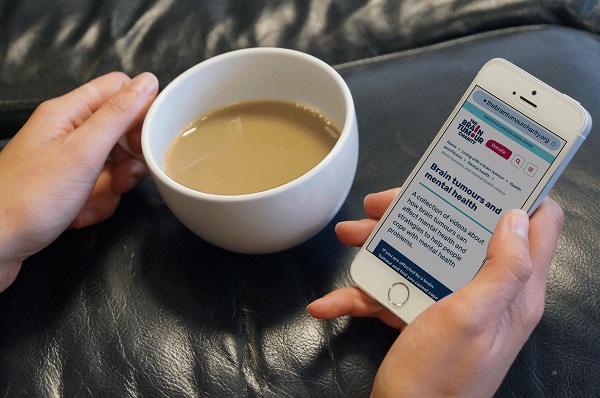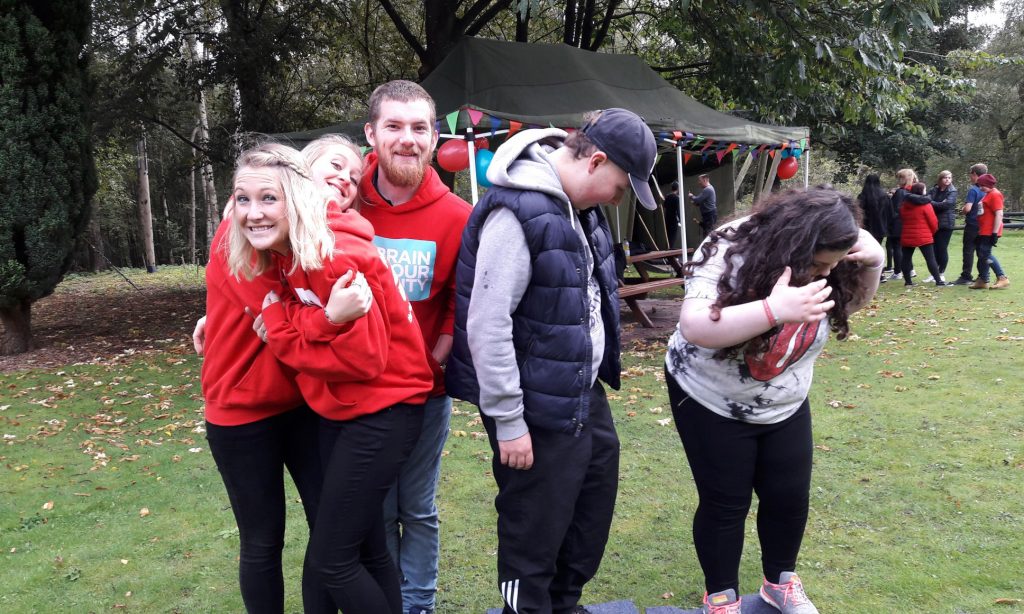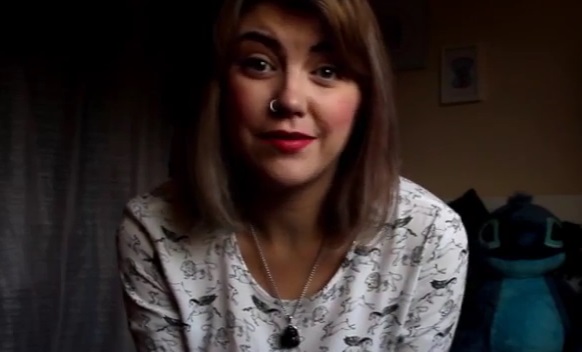How to cope with loneliness and isolation
People affected by a brain tumour can often feel alone or isolated. You may feel like no one understands what you’re going through. If you feel like this, you may want to know how to cope with loneliness and manage these emotions.
Below, we explain why people with a brain tumour might feel lonely or isolated and suggest ways of coping. We’ve also included some quotes and tips from people affected by a brain tumour on how to cope with loneliness and isolation.
On this page we will cover:

Join our community on Facebook
Our closed Facebook groups are a great place to connect with other people affected by a brain tumour and share your experiences.
Feeling alone or isolated
For people living with a brain tumour, feeling lonely or isolated is an all-too-common problem. In our report Losing Myself: The Reality of Life with a Brain Tumour, 91% of people we spoke to said their brain tumour had affected their emotional or mental wellbeing.
Brain tumours are unique because they can affect your personality, cognition (thinking skills), communication and behaviour – all the things that make you who you are.
People often talk about feelings of a loss of identity, particularly if the brain tumour affects your ability to work. It can feel like you are struggling on your own and that other people don’t understand what you’re experiencing.
Working created my identity and that has gone, leaving me empty and without value.
60-year-old man with a high grade tumour
Loneliness is different from isolation, but it is connected. Isolation means being on your own. Loneliness is a feeling of being alone, isolated or disconnected from the world around you, and can happen even if you’re surrounded by family, friends and acquaintances. This could be because you may feel that you don’t have anyone to talk to about what you’re going through. Or you may feel unable to voice your feelings and experiences for fear of upsetting people, particularly those close to you.
Feeling lonely or isolated for an extended period of time can be a symptom of depression. If these feelings don’t improve or you think you may have other symptoms of depression, you should speak to your GP as soon as possible. But it’s important to know that feeling lonely or isolated doesn’t automatically mean you are depressed.
Tips on how to cope with loneliness
Talking
You may feel you want to cope on your own, because you don’t want to burden others with your problems, or you may find some subjects difficult to talk about.
But you’ve probably heard the saying, ‘A problem shared is a problem halved.’ Talking to someone, even just one person you trust and feel comfortable with, can help you manage your feelings and feel less isolated. Our blog, Seven ways that talking about your brain tumour diagnosis can help, helps explain why.
Family members or friends will know you best and will be willing to lend a listening ear. But it doesn’t have to be someone close to you – everyone has different methods for how to cope with loneliness, and what works for some may not work for others.
You may feel more comfortable talking things through with a medical professional, such as your doctor, nurse or a counsellor.

Free counselling
If you need to talk, we’re here for you. We offer free sessions to help you cope.
Support groups
Speaking in a group is not for everyone. But some people find it helpful to meet and spend time with others who are going through similar experiences. We have details of local support groups, sorted by geographical region.
We find such great comfort in our local support group – it’s the highlight of our month. The people there are like family. They’re all going through similar things, so they really understand.
Bridgette, whose husband Jose is living with a brain tumour
Online support
Face-to-face meetings are not for everyone, so many people affected by a brain tumour seek support through the Internet when they’re diagnosed. Meeting and chatting with others online can be a real comfort.
We currently run four online support groups for people affected by a brain tumour.
There is a group that anyone affected by a brain tumour can join. There are also groups specifically for:
- young adults aged 16-30 living with or beyond a brain tumour diagnosis
- parents of children under 18 who have a brain tumour
- people caring for someone with a brain tumour.
Other support services we provide
We have a range of other support services available to help you cope with your brain tumour diagnosis, get information, talk about your concerns and feel less alone or isolated.
Our Treating brain tumours section can give you a better idea of what to expect from your treatment, help you ask your doctor the right questions and give suggestions on how to manage any symptoms and side-effects you may have.
You can also speak to our caring and knowledgeable support team – they can provide a listening ear when you need it, answer your questions and point you towards other services where appropriate. You can call the team on 0808 800 0004, Monday to Friday or email support@thebraintumourcharity.org
Hobbies
Making time for your hobbies and continuing to do the things you enjoy can help. For example, some of the activities our Young Ambassadors have said helped them are: listening to music, drawing or painting, baking and going out to see friends.
Keeping active
Gentle, frequent exercise can help to relieve stress and improve your mood. Exercising with others, such as walking the dog with a friend or going to a class, is also a great way to tackle loneliness or isolation.
It doesn’t have to be anything strenuous. Different things work for different people – you just need to find something that works for you. If you’re not used to exercising, make sure you talk to your consultant or GP before undertaking any demanding physical activity and remember it’s important to start slowly. You don’t want to overdo it by doing too much too soon.
You could start with a 20-minute walk each day, or try stretching exercises like yoga or Pilates. Other ideas include:
- swimming or aqua aerobics
- cycling
- team sports, such as football
- tai chi
- dance classes
- gardening
- tidying and cleaning the house.
Mental exercises, such as Sudoku, puzzles or crosswords, can also help to keep your mind active and occupied.
Mindfulness
Mindfulness – the becoming more aware of the present moment and things around you – has been shown to help mental wellbeing and positively change the way people see themselves and their lives.
You can find many apps to practice mindfulness on the NHS App Library.
And the Mental Health Foundation has an online mindfulness course (£30 in 2019) as well as details of mindfulness teachers in your area.
For me, being a Young Ambassador for The Brain Tumour Charity has improved isolation – there’s other people out there that are like me and going through the same sorts of things I am.
Beth, a former Young Ambassador for The Brain Tumour Charity
Volunteering
Some people have to give up work or reduce their hours or duties when they’re diagnosed with a brain tumour. This can affect their sense of identity and purpose. Volunteering can be an effective way of improving your sense of identity and value, building your self-esteem and reducing loneliness or isolation.
Volunteering can often be undertaken flexibly, and sometimes from the comfort of your own home. For example, by getting involved with research as part of our Research Involvement Network, or helping us maintain our high standard of information by reviewing our resources and making sure they’re fit for purpose before they are published.
Volunteering also has the added benefit of making a real difference! The work we do wouldn’t be possible without the contribution of our fantastic community.
Support and Information Services
Research & Clinical Trials Information
You can also join our active online community.
In this section

Get support
If you need someone to talk to or advice on where to get help, our Support and Information team is available by phone, email or live-chat.
Recommended reading

Tackling isolation
Our Young Ambassadors highlight the reality of living with a brain tumour, sharing their own tips and advice for overcoming this difficult issue.
Recommended reading

#GracesBrain
In the third of her series of vlogs, Grace talks about how it feels to have a brain tumour, her treatment and surgery, and our Facebook support groups.
Recommended reading
Share your experiences and help create change
By taking part in our Improving Brain Tumour Care surveys and sharing your experiences, you can help us improve treatment and care for everyone affected by a brain tumour.
- Blog post
- BRIAN
- Celebrating You
- Charity news
- Fundraising
- Guest Authors
- HeadSmart
- High Profile Supporter
- Partnerships
- Policy & Public Affairs
- Research
- Streaming and gaming
- Support
- Supporter stories
- The Big Bake
- Treatments
- Uncategorized
- Young adults
- Blog post
- BRIAN
- Celebrating You
- Charity news
- Fundraising
- Guest Authors
- HeadSmart
- High Profile Supporter
- Partnerships
- Policy & Public Affairs
- Research
- Streaming and gaming
- Support
- Supporter stories
- The Big Bake
- Treatments
- Uncategorized
- Young adults
- Blog post
- BRIAN
- Celebrating You
- Charity news
- Fundraising
- Guest Authors
- HeadSmart
- High Profile Supporter
- Partnerships
- Policy & Public Affairs
- Research
- Streaming and gaming
- Support
- Supporter stories
- The Big Bake
- Treatments
- Uncategorized
- Young adults
